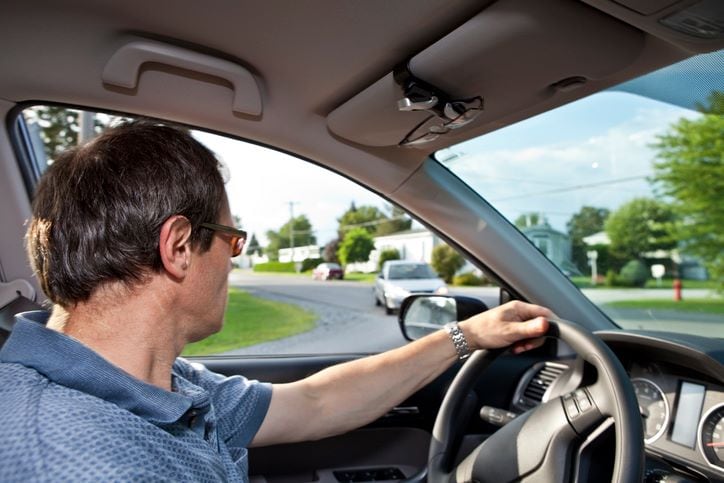
Every day, thousands of vehicles traverse the roads of Las Vegas Nevada. From bustling city streets to quiet rural highways, the flow of traffic is constant. However, amidst this constant movement, accidents can and do happen. One common type of accident is the failure to yield right of way accident. In this article, we’ll delve into what constitutes such an accident, Nevada’s right of way laws, legal responsibilities, victim’s rights to compensation, and how fault is determined in these cases.
What is a Failure to Yield Right of Way Accident?
A failure to yield accident occurs when a driver fails to give the right of way to another vehicle or pedestrian when required to do so by traffic laws. This could happen at intersections, merges, or when entering or exiting a roadway. Failure to yield accidents often involve two vehicles colliding, but they can also involve a vehicle hitting a pedestrian or cyclist.
Nevada’s Right of Way Laws at a Glance
Nevada Revised Statutes (NRS) Section 484b.257 specifically addresses failure to yield right of way accidents. According to this statute, drivers must yield the right of way in the following situations:
When approaching a yield sign.
When entering a controlled access highway from a private driveway or road.
When turning left at an intersection.
When a pedestrian is crossing the road within a marked or unmarked crosswalk.
When merging onto a roadway from a side road.
Failure to adhere to these laws can result in serious car accidents and legal consequences for the at-fault party.
Who Has the Right of Way?
Understanding right of way is crucial for safe and responsible driving in Nevada. Whether you’re navigating busy intersections, yielding to pedestrians, or merging onto highways, knowing who has the right of way can prevent accidents and ensure smooth traffic flow.
Rules at Intersections, Road Entrances, and Merges
Intersections are common sites for failure to yield accidents. Nevada law requires drivers to yield the right of way to vehicles already in the intersection or approaching from the opposite direction. This means waiting for a safe gap in traffic before proceeding through the intersection or making a turn.
At road entrances and merges, drivers must yield to vehicles already traveling on the main roadway. This helps prevent dangerous situations where merging vehicles force others to take evasive action to avoid a collision.
Rules Relating to Pedestrians
Pedestrians have the right of way at marked and unmarked crosswalks. Drivers must yield to pedestrians and allow them to safely cross the road. Failing to do so can result in devastating consequences, including serious injury or death.
Right of Way Rules for Cyclists
Cyclists are considered vehicles under Nevada law and are entitled to the same rights and responsibilities as motorists. Drivers must yield to cyclists when appropriate, such as when overtaking them on the road or when cyclists have the right of way at intersections.
Rules Relating to Emergency Vehicles and School Buses
When emergency vehicles or school buses are approaching with lights and sirens activated, drivers must yield the right of way and pull over to allow them to pass safely. Failure to do so can impede the progress of emergency responders or endanger school children.
Legal Responsibility for Failure to Yield Accidents
Determining legal responsibility in a failure to yield accident typically involves proving negligence on the part of the at-fault driver. Negligence may include actions such as:
Failing to obey traffic signs (such as stop sign) or signals.
Failing to yield to oncoming traffic.
Failing to yield to pedestrians or cyclists in crosswalks or bike lanes.
Failing to yield when merging onto a highway.
Failing to yield to emergency vehicles or school buses with activated lights and sirens.
If you’ve been involved in a failure to yield accident, it’s crucial to gather evidence to support your claim. This evidence may include eyewitness testimonies, photographs of the accident scene, police reports, and medical records detailing injuries sustained in the car accident.
How Do You Prove Fault in a Right of Way Accident?
Proving fault in a failure to yield accident requires gathering evidence and building a strong case. This may include:
Witness statements: Eyewitness accounts can provide valuable insight into how the accident occurred and who was at fault.
Police report: The official police report will document details of the accident, including any citations issued to the at-fault driver.
Skid marks and other physical evidence: Tire marks on the road, vehicle damage, and other physical evidence can help reconstruct the accident and determine fault.
Traffic camera footage: If available, surveillance footage from nearby cameras can provide visual evidence of the accident.
Expert testimony: Accident reconstruction experts may be called upon to analyze the evidence and provide expert testimony regarding fault.
Legal Consequences of Failure to Yield Right of Way Accidents
The legal consequences of a failure to yield right of way accident in Nevada can vary depending on the circumstances of the incident and the extent of the damage or injuries involved. Here are some potential legal consequences for the at-fault party:
Traffic Citations: At-fault drivers may receive citations from law enforcement, leading to fines or penalties.
Civil Liability: They may be held responsible for compensating the injured party for damages, including medical expenses and lost wages.
Insurance Consequences: At-fault drivers may face increased insurance premiums and their policy may cover damages to the other party.
Legal Action: Injured parties may pursue legal action, resulting in further expenses and potential court-ordered damages.
Driver’s License Points: Accumulation of points on the driver’s license may occur, potentially leading to license suspension.
Criminal Charges: In severe cases, at-fault drivers may face criminal charges such as reckless driving or vehicular manslaughter, resulting in fines or imprisonment.
Victim’s Rights to Compensation in a Nevada Failure to Yield Accident
Victims of failure to yield right of way accidents may be entitled to compensation for various damages, including:
Medical bills: Costs associated with hospitalization, surgery, medication, rehabilitation, and other medical expenses resulting from injuries sustained in the accident.
Lost wages: Compensation for income lost due to missed work days or reduced earning capacity resulting from injuries sustained in the accident.
Property damage: Costs associated with repairing or replacing damaged vehicles or other property involved in the accident.
Pain and suffering: Non-economic damages for physical pain, emotional distress, and mental anguish resulting from the accident and subsequent injuries.
In cases where the at-fault driver’s actions were particularly egregious, punitive damages may also be awarded to punish the responsible party and deter similar behavior in the future.
How an Attorney Can Help You in a Failure to Yield Right of Way Accident Case
Being involved in a failure to yield right of way accident can be a traumatic experience, leaving you with injuries, medical bills, and emotional distress. During such challenging times, seeking the assistance of an experienced attorney can make a significant difference in your ability to recover compensation and navigate the legal process effectively. Here’s how an attorney can help you in this case:
Legal Guidance and Representation: Attorneys provide expert legal advice and representation throughout the process.
Investigation and Evidence Gathering: They conduct thorough investigations and gather evidence to build a strong case.
Negotiating with Insurance Companies: Attorneys handle all communications and negotiate fair settlements with an insurance company.
Determining Liability: Attorneys analyze evidence to determine who is at fault for the accident, identifying negligent drivers and potentially liable parties.
Calculating Damages: Attorneys assess the full extent of damages and seek maximum compensation for medical expenses, lost wages, etc.
Court Representation: If needed, attorneys represent clients in court, presenting their case to seek fair compensation.
Providing Support and Advocacy: Attorneys offer support and advocacy, ensuring clients’ voices are heard and rights protected throughout the process.

Secure Your Right to Compensation with BLG
Failure to yield right of way accidents can have serious consequences for those involved. Understanding Nevada’s right of way laws and legal responsibilities is essential for all drivers and pedestrians. If you’ve been injured in a failure to yield accident, it’s important to seek legal guidance to protect your rights and pursue fair compensation. Remember, exercising caution and following the rules of the road can help prevent traffic accidents and keep everyone safe on Nevada’s streets and highways.
Are you a victim of a failure to yield right of way accident in Nevada? Don’t let your rights go unrecognized. At BLG, we’re dedicated to fighting for justice on your behalf. Our experienced team of attorneys understands the intricacies of Nevada’s right of way laws and will work tirelessly to ensure you receive the compensation you deserve.
Contact us today for a free consultation.
FAQs
When we fail to yield the right of way, a collision can easily occur.
Yes, failing to yield the right of way can lead to collisions due to miscommunication or unexpected movements by drivers.
Is failure to yield the right of way a major cause of collisions in Nevada?
Yes, failure to yield the right of way is a significant factor contributing to collisions in Nevada and elsewhere.
Are you legally obligated to yield the right of way?
Yes, drivers are legally obligated to yield the right of way in accordance with traffic laws and regulations to ensure safety on the roadways.





